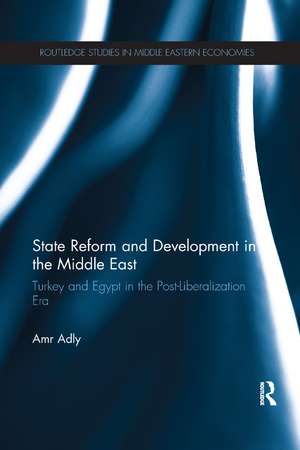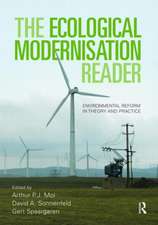State Reform and Development in the Middle East: Turkey and Egypt in the Post-Liberalization Era: Routledge Studies in Middle Eastern Economies
Autor Amr Adlyen Limba Engleză Paperback – 24 mai 2017
In this book, Amr Adly uses extensive primary research to present detailed comparisons of Turkey’s and Egypt’s state administrative and private sector capacities and links between the two. The conclusion the author draws is that the external contexts for both were so alike that this cannot account for their diverging paths. Instead, the author suggests a counterintuitive yet compelling explanation; that a democratic polity is far more likely than an authoritarian one to engender a successful developmental state.
Emerging in the wake of the January revolution in Egypt, when hopes for democratisation were raised, this book provides a fresh perspective on the topical subject of state reform and development in the Middle East and will be of interest to students and scholar alike.
| Toate formatele și edițiile | Preț | Express |
|---|---|---|
| Paperback (1) | 299.52 lei 6-8 săpt. | |
| Taylor & Francis – 24 mai 2017 | 299.52 lei 6-8 săpt. | |
| Hardback (1) | 1057.89 lei 6-8 săpt. | |
| Taylor & Francis – 29 noi 2012 | 1057.89 lei 6-8 săpt. |
Preț: 299.52 lei
Preț vechi: 356.64 lei
-16% Nou
Puncte Express: 449
Preț estimativ în valută:
57.32€ • 59.62$ • 47.32£
57.32€ • 59.62$ • 47.32£
Carte tipărită la comandă
Livrare economică 14-28 aprilie
Preluare comenzi: 021 569.72.76
Specificații
ISBN-13: 9781138108189
ISBN-10: 1138108189
Pagini: 288
Dimensiuni: 156 x 234 mm
Greutate: 0.45 kg
Ediția:1
Editura: Taylor & Francis
Colecția Routledge
Seria Routledge Studies in Middle Eastern Economies
Locul publicării:Oxford, United Kingdom
ISBN-10: 1138108189
Pagini: 288
Dimensiuni: 156 x 234 mm
Greutate: 0.45 kg
Ediția:1
Editura: Taylor & Francis
Colecția Routledge
Seria Routledge Studies in Middle Eastern Economies
Locul publicării:Oxford, United Kingdom
Public țintă
Postgraduate and UndergraduateCuprins
Introduction 1. Why does State Reform vary among Developing Countries? 2. Escort States and Export Restructuring 3. What Happened in Turkey (1983-2010)? 4. Mission Unaccomplished: Egypt (1990-2010) 5. Whence come State Reform? 6. Political Competition and Institutional Reform 7. Revenue-Bases and State Reform 8. Pathways to Export-Lled Growth: ISI Institutional Legacy and State Reform 9. External Factors and State Reform 10. The End of a Non-Developmental Regime: Mubarak’s Decline and Fall (2004-2011) 11. Concluding Remarks
Notă biografică
Amr Adly holds a PhD from the European University Institute-Florence and currently works as a senior researcher at the Egyptian Initiative for Personal Rights, heading the unit of social and economic rights.
Descriere
The economies of Turkey and Egypt, remarkably similar until the early 1980s, have since taken divergent paths. Turkey has successfully implemented a policy of export led industrialisation whilst Egypt’s manufacturing industry and exports have stagnated.
In this book, Amr Adly uses extensive primary research to present detailed comparisons of Turkey’s and Egypt’s state administrative and private sector capacities and links between the two. The conclusion the author draws is that the external contexts for both were so alike that this cannot account for their diverging paths. Instead, the author suggests a counterintuitive yet compelling explanation; that a democratic polity is far more likely than an authoritarian one to engender a successful developmental state.
Emerging in the wake of the January revolution in Egypt, when hopes for democratisation were raised, this book provides a fresh perspective on the topical subject of state reform and development in the Middle East and will be of interest to students and scholar alike.
In this book, Amr Adly uses extensive primary research to present detailed comparisons of Turkey’s and Egypt’s state administrative and private sector capacities and links between the two. The conclusion the author draws is that the external contexts for both were so alike that this cannot account for their diverging paths. Instead, the author suggests a counterintuitive yet compelling explanation; that a democratic polity is far more likely than an authoritarian one to engender a successful developmental state.
Emerging in the wake of the January revolution in Egypt, when hopes for democratisation were raised, this book provides a fresh perspective on the topical subject of state reform and development in the Middle East and will be of interest to students and scholar alike.























